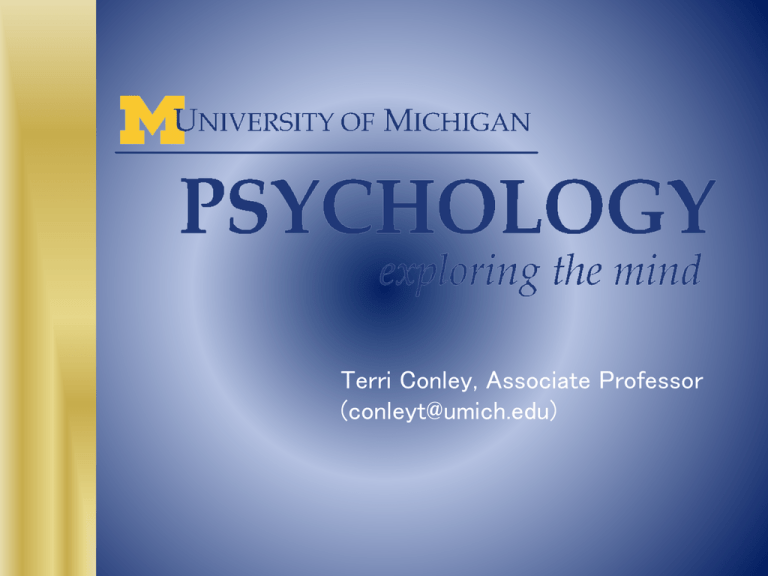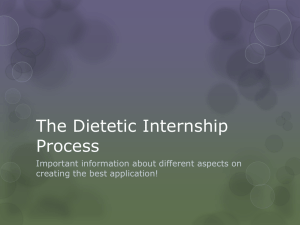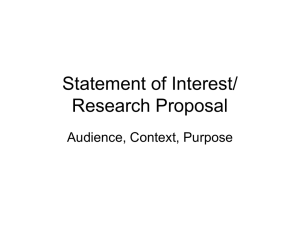
Terri Conley, Associate Professor
(conleyt@umich.edu)
Dedicated to Success
• Complete the PhD degree: 91%
• Average Time to PhD: 5.5 years
• First position is Academic: 81%
– Postdoctoral Fellow: 55%
– Tenure Track: 20%
– Other University: 6%
– Government/Non-Profit/Private Sector: 10%
Dedicated to Research Breadth
•
•
•
•
•
•
•
•
•
•
•
•
•
African American Racial Identity
Competition and Group Size
How Siblings Shape and Annoy Us
The Multitasking Brain
How Fear Flows through the Mind
The East-West Divide in Cognition
Effects of Violence on Children
Incivility in the Workplace
How Liking Turns to Wanting
Media and Sexual Socialization
Women in Science Fields
Cross-training your Brain
Why Stress Triggers Binge Eating
•
•
•
•
•
•
•
•
•
•
•
•
•
Genetics in Face & Place Recognition
How Spanking Hatches Bullies
Conversation Boosts Brain Power
Estrogen and the Allure of Vices
“Dirty” Hands and Mouths
With Age Comes Wisdom
What Makes Life Worth Living
What Motivates Kids in School
Managing Bicultural Identities
Minority Attitudes Toward Whites
Racial Discrimination in School
How Drug Abuse Changes the Brain
How Sex Changes our Hormones
We are committed to fostering research
across subfields of psychology and across disciplines!
Dedicated to Diversity:
Ranked #1 in the Nation in Support and
Placement of Diverse Students
•Out of 81 faculty…
•26% are faculty of color
•47% are women
•Out of 197 graduate students…
•40% are ethnic minority or international students
•73% are women
•Graduate student organizations
• Asian American Psych Student Association (APSA)
• Black Student Psych Association (BSPA)
• Latino/a Student Psych Association (LSPA)
• Students of Color of Rackham (SCOR)
Program Areas
Biopsychology
Clinical
Cognition & Cognitive Neuroscience
Developmental
Personality & Social Contexts
Social
Education & Psychology
Social Work & Psychology
Women’s Studies & Psychology
Biopsychology
Learning
Attention
Reward
Motivation
Sex
Behavior
Social
Behavior
Physiology
In the Lab
and Field
• Ranked #1 Behavioral Neuroscience program
in psychology
• Research at the interface of behavior,
biology, and evolutionary theory
• Tracks: Brain and Behavior; Evolution of
Behavior
Clinical Psychology
Assessment
Treatment
Prevention
Psychopathology
Neurodevelopmental
disorders
Minority
mental health
Cultural
competence
– APA-accredited, Clinical Science program
– Prepare students for academic/research careers
– Train students in clinical practice (prevention,
assessment, case conceptualization, &
intervention) to inform their clinical research
– APA Suinn Award:
excellence in the
recruitment,
retention and
graduation of
ethnic minority
students
Cognition & Cognitive Neuroscience
Performance
Sensation
Perception
Language
Thinking
Problem Solving
Decision Making
Judgment
Categorization
Learning
Memory
Attention
Motor Control
• Research interests in all
areas of human cognitive
psychology and cognitive
neuroscience
• Develop skills in
mathematics, statistics,
neuroscience, artificial
intelligence & psychology
Developmental
Psychology
Cognitive
Development
Social
Development
Language
Family
Media
Neuroscience
Poverty
Ethnicity
Gender
Motivation
Theory of
Mind
• #1 ranked Developmental
Psychology program in the nation
• The study of social and cognitive
change from infancy to old age
• Lifespan Development
– Development in context (schools,
families, neighborhoods)
– Risk and resilience
– Normative development
Power
Identity
Oppression
Culture
Diversity
Body
Image
Stigma
Sexuality
Emotion
Work
School
Gender
Race
Personality &
Social Contexts
• Highly unique program: Blend of Applied Social,
Organizational, Personality, & Community
Psychology
• Focused on the interplay of individual
differences and social contexts
• Training in a wide range of diverse & innovative
methods
Violence
Culture &
Cognition
Decision
Making
Emotion
Evolution
Group
Processes
Law
Identity
Prejudice
Self
Social
Cognition
Social Psychology
• Top-ranked Social Psych program in US
• The study of social behavior
• The relations between people and groups
– How thoughts, feelings and behaviors are
influenced by other people
Combined Program in Education
and Psychology (CPEP)
Motivation
Achievement
Learning
Pedagogy
Cognitive
Development
Social
Development
Self-Regulation
Self-Concept
Racial Identity
School Climate
• Apply psychological
theory to educational
issues
• Faculty from the School
of Education and
Psychology
• Four broad research themes:
•
Human Development in Context
•
Cognitive and Learning Sciences
•
Motivation and Self-Regulated Learning
•
Resilience and Development
Poverty
Mental
Health
Gerontology
Youth
Engagement
Policy
Prevention
Intervention
Law
Child Welfare
LGBT Youth
Joint Program in Social
Work & Psychology
• First program of its kind
• Focus: social problems, social change, social
interventions, and social welfare
• Joint degree in any area of psychology
• Graduates are highly recruited & well-placed in
academic jobs
Psychology and Women’s Studies
Gender, race,
and class
Violence
against
women
Sexuality
Gender
harassment
Anti-LGBQ
prejudice
• First program of its kind
• Joint PhD in Psychology & Women’s Studies
• Area of Psych: Personality & Social Contexts
Gender in
adolescence
• Apply women’s studies theories and
methods to psychological research topics
Gender in the
media
• Graduates are well-placed in academic jobs
Sex hormones
My Research
Interrogating Monogamy
Are non-monogamous relationships healthy?
Does (ostensible) monogamy actually prevent
the spread of STIs?
Gender Difference in Sexuality OR
Do Women Actually Like Sex Less?
Why do women like casual sex less than men?
Why do women fantasize about submission more
than men?
Why do women report less desire than men?
The Funding Plan
Five Years Fully Funded:
Tuition – fully covered
Health insurance – fully covered
Stipend – over $100K over 5 years
Five semesters of teaching (as a TA)
Five semesters of research fellowship
Four summers of funding included
Retention
The
an
Michigan Psychology graduate program has
overall re te nt i o n
rate of
91% f o r
s t u d e n t s who began in the Fall 2000 through Fall 2003
Some Links
• Psychology Department:
– http://www.lsa.umich.edu/psych/grad/program/
• Psychology Diversity:
– http://www.lsa.umich.edu/psych/diversity/
• Summer Research Opportunity Program:
– http://www.rackham.umich.edu/student_life/div
ersity/community/srop/
Applying to Graduate School
in Psychology
Terri Conley
UM Recruitment Workshop
October 14, 2013
Is Grad School Right for You?
(AKA: a realistic look at life in grad school)
PhD Programs
Average 5-6 years (can take between 4-8 years!)
Intense! Full time job!
Are you comfortable with public speaking?
Usually fully funded (do not pay for your PhD)
Are you sure you love love LOVE this type of research?
Usually requires you to teach (TA/GSI)
Can you commit to that right now?
However, doesn’t pay well and often not allowed to work elsewhere
Are you ok with making little money for now?
Masters Programs
Average 2 years (can take between 1-3 years)
Usually have to pay
Tuition, teaching, workload varies
Apply Now or Later? (or at all?)
High
GRE?
yes
High
GPA?
no
yes
Lots of
yes
Research
Experience?
no
Idea of
what
to study?
no
yes
Life
Experience?
no
no
consider a full-time research job
or Master’s program
o develop or solidify your interests
consider
retaking
the test
and
re-applying
This may be your
last good chance
to do something
interesting that
you always
wanted to try out
yes
Apply
Now!
Gaining Research Experience
Undergraduate Research Experience
Research Assistant
Any research experience is good research experience
Builds skills and discipline. Is it really what you want to do?
Do an undergraduate thesis if possible
Summer research internships (before your sophomore or jr year)
Ask professors for any opportunities they may know of
Don’t be afraid to go to another part of the country!
Research Post-Undergrad
Lab manager positions
Paid vs. Volunteer
Ask around!!!
The GRE
Computer-based, adaptive, LEARNABLE
Study 1-3 months
Get books: Kaplan (practice) Princeton Review (tricks)
Take LOTS of practice exams
GRE Importance varies
Some schools/departments have cut offs, others don’t.
Check websites, ask people (don’t let it deter you)
My department doesn’t weigh GREs heavily
Not doing poorly is more important than doing really well
Psychology GRE is less important (UM doesn’t require
it!)
Research Tips
Know what research you want to do BEFORE applying to grad
school
Admissions look for clear research plans
Do NOT want to try to decide in grad school -- NOT the time to
decide on research
What drives you? What interests you about psychology? **What
would you learn more about on your own even if NO ONE made
you read it? – Study that!
Build bridges and maintain the bridges
Your professors have connections, research opportunities,
experience. Talk to them!
Letters of Recommendation
How Many?
Three. At least 2 academic letters. Preferably least 1 research related.
How to ask
Ask profs/grad students who know you well (plan ahead)
* STRONG * letter of rec. for grad school
Give them an out (“I understand if you’re too busy..”)
When to ask
Early! (+1 month); Right after course/research assistantship
Send reminders as deadlines approach
What to give
Any and all materials
Tell them how they can help you!!
CVs, personal statements, writing samples, info about programs
Learning disability? Great class research project?
Envelopes, stamps, addresses, forms, timelines
Keep them organized, make it easy
Say thank you!!!
Application Checklist
Statement of Purpose
Transcripts (all)
Letters of Recommendation
GRE score reports
University application form
Departmental application form (occasionally)
Curriculum Vitae, or c.v. (usually optional)
Writing sample (usually optional)
Timeline
Research grad
schools and
advisors
Summer
Sept
Oct
Nov
Dec
Jan
Feb
Mar
Apr
Timeline
Research grad
schools and
advisors
Study for and
take the GRE
Summer
Sept
Oct
Nov
Dec
Jan
Feb
Mar
Apr
Timeline
Research grad
schools and
advisors
Study for and
take the GRE
Summer
Sept
Organize
applications
with a
spreadsheet
Oct
Nov
Dec
Jan
Feb
Mar
Apr
Timeline
Research grad
schools and
advisors
Start statement
of purpose
Study for and
take the GRE
Summer
Sept
Organize
applications
with a
spreadsheet
Oct
Nov
Dec
Jan
Feb
Mar
Apr
Timeline
Research grad
schools and
advisors
Start statement
of purpose
Study for and
take the GRE
Summer
Sept
Oct
Ask for letters of
recommendation
Organize
applications
with a
spreadsheet
Nov
Dec
Jan
Feb
Mar
Apr
Timeline
Research grad
schools and
advisors
Start statement
of purpose
Study for and
take the GRE
Summer
Contact
potential
advisors
Sept
Oct
Ask for letters of
recommendation
Organize
applications
with a
spreadsheet
Nov
Dec
Jan
Feb
Mar
Apr
Timeline
Research grad
schools and
advisors
Start statement
of purpose
Study for and
take the GRE
Summer
Contact
potential
advisors
Sept
Oct
Nov
Ask for letters of
recommendation
Organize
applications
with a
spreadsheet
Finalize
your list
Dec
Jan
Feb
Mar
Apr
Timeline
Send GRE
Research grad
reports,
schools and
transcripts, etc
advisors
Start statement
of purpose
Study for and
take the GRE
Summer
Contact
potential
advisers
Sept
Oct
Nov
Ask for letters of
recommendation
Organize
applications
with a
spreadsheet
Finalize
your list
Dec
Jan
Feb
Mar
Apr
Timeline
Send GRE
Research grad
reports,
schools and
transcripts, etc
advisors
Start statement
of purpose
Remind
Study for and
Contact
LOR
take the GRE
potential
writers
advisors
Summer
Sept
Oct
Nov
Ask for letters of
recommendation
Organize
applications
with a
spreadsheet
Finalize
your list
Dec
Jan
Feb
Mar
Apr
Timeline
Send GRE
Research grad
reports,
schools and
transcripts, etc
advisors
Start statement
of purpose
Remind
Study for and
Contact
LOR
take the GRE
potential
writers
advisors
Summer
Sept
Oct
Nov
Ask for letters of
recommendation
Organize
applications
with a
spreadsheet
Finalize
your list
Dec
Finish
SOP,
C.V.
Jan
Feb
Mar
Apr
Timeline
Send GRE
Research grad
reports,
schools and
transcripts, etc
advisors
Start statement
Submit
of purpose
applications!
Remind
Study for and
Contact
LOR
take the GRE
potential
writers
advisors
Summer
Sept
Oct
Nov
Ask for letters of
recommendation
Organize
applications
with a
spreadsheet
Finalize
your list
Dec
Finish
SOP,
C.V.
Jan
Feb
Mar
Apr
Timeline
Send GRE
Research grad
reports,
schools and
transcripts, etc
advisors
Start statement
Submit
of purpose
applications!
Remind
Study for and
Contact
LOR
take the GRE
potential
writers
advisors
Summer
Sept
Oct
Nov
Ask for letters of
recommendation
Organize
applications
with a
spreadsheet
Finalize
your list
Dec
Jan
Finish
SOP,
C.V.
Verify
applications
are complete
Feb
Mar
Apr
Timeline
Send GRE
Research grad
reports,
schools and
transcripts, etc
advisors
Start statement
Submit
of purpose
applications!
Remind
Study for and
Contact
LOR
Begin to hear
take the GRE
potential
writers
good news
advisors
Summer
Sept
Oct
Nov
Ask for letters of
recommendation
Organize
applications
with a
spreadsheet
Finalize
your list
Dec
Jan
Finish
SOP,
C.V.
Verify
applications
are complete
Feb
Mar
Apr
Timeline
Send GRE
Research grad
reports,
schools and
transcripts, etc
advisors
Start statement
Submit
of purpose
applications!
Remind
Study for and
Contact
LOR
Begin to hear
take the GRE
potential
writers
good news
advisors
Summer
Sept
Oct
Nov
Ask for letters of
recommendation
Organize
applications
with a
spreadsheet
Finalize
your list
Dec
Finish
SOP,
C.V.
Jan
Feb
Begin to
travel
Verify
applications
are complete
Mar
Apr
Timeline
Send GRE
Research grad
reports,
schools and
transcripts, etc
advisors
End of good
Start statement
Submit
news; begin to
of purpose
applications!
hear bad news
Remind
Study for and
Contact
LOR
Begin to hear
take the GRE
potential
writers
good news
advisors
Summer
Sept
Oct
Nov
Ask for letters of
recommendation
Organize
applications
with a
spreadsheet
Finalize
your list
Dec
Finish
SOP,
C.V.
Jan
Feb
Begin to
travel
Verify
applications
are complete
Mar
Apr
Timeline
Send GRE
Research grad
reports,
schools and
transcripts, etc
advisors
End of good
Start statement
Submit
news; begin to
of purpose
applications!
hear bad news
Remind
Study for and
Contact
LOR
Begin to hear
take the GRE
potential
writers
good news
advisors
Summer
Sept
Oct
Nov
Ask for letters of
recommendation
Organize
applications
with a
spreadsheet
Finalize
your list
Dec
Finish
SOP,
C.V.
Jan
Feb
Mar
Apr
Begin to
travel
Verify
applications
are complete
All final
decisions
by Apr 15
Researching Programs
Make LONG list of schools (~40)
What to look for
Look at rankings of programs; journal articles; ask profs
Research each school on your list (websites)
Faculty research interests on dept. website
Recent faculty pubs
Lab websites
Ph.D. requirements, feel of program
Email/contact possible schools for more info!!
Potential professors
Current graduate students
Email to faculty
Dear Dr. _____,
Hello, my name is_____. I am a senior at _____(or graduated from ___on
MONTH/YEAR) and I am planning to apply to the University of ________
Program in _____________Psychology for possible entry in fall 2008. Thus
my reason for emailing you.
I have read about the areas of research you work on. I am broadly
interested in issues relating to the academic achievement of students of
color. More specifically, I am interested in ways in which students of
color define and understand their racial identities and how this relates
to how they come to challenge stereotypes and perceptions of them in
relation to academics, in predominantly white campuses. I believe my
research interests intersect quite well with your current work.
I was wondering whether you would be taking on students for fall 2018.
This way, I will know whether to mention you as one of the possible
faculty that I am interested in working with if I were to be accepted to
the program.
If you could answer this question for me, it would be greatly appreciated.
Please feel free to let me know of any other suggestions you might have.
Thank you for your time.
Enclosed you will find my curriculm vita.
Sincerely,
Where to apply?
Find programs with the best FIT
Faculty with similar research interests
Positive contact with professors
Meet criteria (GRE scores, statistics background)
* Two or more potential advisors HUGE plus*
Should have a few safety schools, a few
reach schools, a few in between (~7+)
Writing Statements
Research & Personal Statements (AKA “statement
of purpose”)
Most important part of application!
Varies by school – FOLLOW INSTRUCTIONS
Revise/have advisor/GSI read it
Tailor statements to each school
Emphasize research experience & interests
Talk explicitly about who you want to work with (name
faculty)
Be as detailed as possible about what you want to
research (PROPOSE AN ACTUAL PROJECT!)
Statement of Purpose
Possible Structure
How Psych excites you; background/preparation
Specific interests; Research experience
Plans for grad school; Plans beyond grad school
Why this school in particular (including faculty)
Tips
Explain how grad school is the next logical step
Avoid cliches (do not say you’ve always been curious!)
Show, don’t tell (do not be arrogant)
Be concise (people read LOTS of these)
Be careful (think of your reader!)
Include the future
Addendum to Application
To the Admissions Committee:
I am writing this letter to ask the admissions committee to take into
consideration my documented learning disabilities as they consider my
application. I was given diagnoses of documented learning disabilities
on Data and Year (type of disability).
I believe my GRE scores are not an accurate representation of my true
abilities and potential as a student. I would note that my SAT and ACT
scores (specify score if relevant) did not accurately predict how
successful I could be as a college student.
I have learned how to use compensatory techniques while taking exams
and completing academic coursework, earning a ___GPA for my last two
years.
In sum, I believe that my intellectual curiosity and dedication are
not accurately portrayed through my test scores and overall GPA.
Thank you for taking this letter into consideration.
Sincerely,
Decisions
Overrated factors
Underrated factors
Prestige of University
Research Match
Prestige of Faculty Advisor
Personality of Faculty Advisor
Absolute Stipend
Other Students
Location (fun/city)
Departmental Collaborations
The Visit
Departmental / Lab Money
It’s where you got in
Taking time off
Be nice: Don’t hang on to multiple offers for long!
Good Luck!
Additional Resources
http://www-personal.umich.edu/~mooreks/
http://community.livejournal.com/applyingtograd/
http://www.psychgrad.org/
http://gradschool.about.com/od/admissionsadvice/a/overview.htm
http://www.thegradcafe.com/
Terri Conley, Associate Professor
(conleyt@umich.edu)






